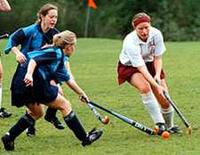Field Hockey
FIELD HOCKEY started in Canada in the late 19th century with the inception of the VANCOUVER Hockey Club in 1895 and the Vancouver Ladies Hockey Club in 1896. Competition took place between teams from Vancouver, VICTORIA, NANAIMO, NEW WESTMINSTER and WELLINGTON and a men's BC championship was awarded as early as 1903. McGill Univ College, the forerunner of UBC, formed its first women's team around 1910. The first international match was likely between a Victoria men's team (featuring future BC premier John HART) and Seattle in 1907. The Challenge Cup was inaugurated in 1911 for competition within the BC Grass Hockey Assoc composed of men's teams from Vancouver, Victoria, the ESQUIMALT Garrison, JAMES BAY and N VANCOUVER. Between the world wars the Challenge Cup was awarded to champions of the Mainland Grass Hockey Assoc, while the separate Vancouver Island & Gulf Island Hockey Assoc competed for another trophy. Representative teams from each league met every year to compete for the O.B. Allen Cup. The Women's Lower Mainland Grass Hockey Assoc, started by Marjorie McKay, in its first season 1929–30 played a handful of games with teams from Victoria, DUNCAN and GANGES. Vancouver, Duncan and Victoria formed the Triangle League in 1939 but women's hockey did not have provincewide organized competition until the BC Women's Field Hockey Federation started in 1966.
International competition came to the fore when an Australian women's team visited Vancouver and Duncan in 1936 and women's and men's clubs from Vancouver participated in tournaments against California teams. In 1938 Con JONES (later Callister) Park hosted a Los Angeles side in N America's first grass hockey match under floodlights. The first major tournament held in Canada, the Pacific Northwest Field Hockey Conference, took place in Vancouver in 1950. In 1956 the Greater Vancouver Women's Grass Hockey Assoc sent a team to Sydney, Australia, to represent Canada at an International Federation of Women's Hockey tournament. The Vancouver club, featuring future BC Sports Hall of Fame members Eleanor Whyte and Moira Colbourne, went on a 1959 tour that included the world championships in Amsterdam. Vancouver women represented Canada again at the 1960 US National Tournament.
It was not until the early 1960s that field hockey organizations across the country were united. Harry WARREN put together the Canadian Field Hockey Assoc and assisted a women's group chaired by Barbara Schrodt in the formation of the Canadian Women's Field Hockey Assoc. The 2 associations eventually merged into Field Hockey Canada in 1992. In 1964 the CFHA sent a men's team to the Tokyo Olympics. Vancouver was the location for both the CFHA's first men's national championship in 1964 and the inaugural CWFHA nationals in 1965. The city later hosted 2 international tournaments: the 1979 IFWHA Tournament and the 1985 Junior Men's World Cup.
BC dominated the national game right through the turn of the century, winning more Canadian championships than any other province and providing a large proportion of the top talent on both the men's and women's national teams. In the early 1980s, the Canadian women's team became one of the world's best. BC's Nancy Charlton, Heather Benson, Jody Blaxland, Alison Palmer, Diane Mahy (Virjee) and Shelley Winter helped the team reach the podium at the 1983 and 1986 World Cups and at the 1987 Pan Am Games. Lynne Beecroft, a star mid-fielder from Duncan, joined Winter and Charlton for the 1983 World Cup silver and Canada's fifth-place finish in the 1984 Los Angeles Olympics. UBC has had a very successful women's field hockey program, winning 5 CIAU championships in the period 1978–91 under coach Gail Wilson. Wilson's replacement Hash Kanjee and team captain Jen Dowdswell led UBC to another CIAU title in 1998. In 1999, UBC won again in the second consecutive all-BC final with UNIV OF VICTORIA.
Prominent BC men to play the game in recent years include Lee Wright, Kelvin Wood, Alan Hobkirk, David Bissett, Ross Rutledge, Bubli Chohan, Chris Gifford, Peter Milkovich and Mike Mahood. The Canadian men's team qualified for the Olympics several times starting in 1964 and captured Pan Am gold medals in 1983, 1987 and 1999. Chohan participated in every major event from 1974 to the 1998 World Cup qualifying rounds, accumulating a Canadian record 288 international caps. Warren and Schrodt have both been inducted into the BC SPORTS HALL OF FAME for their outstanding achievements as builders.
by Silas White

